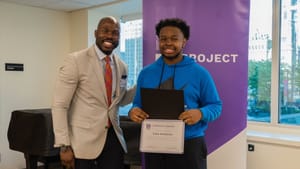Stay in the Loop
BSR publishes on a weekly schedule, with an email newsletter every Wednesday and Thursday morning. There’s no paywall, and subscribing is always free.
A different frequency of learning
Tuning youth advocacy in music with Joseph H. Conyers and Project 440

When Joseph H. Conyers was named principal bass of the Philadelphia Orchestra this year, he joined a minuscule subset of a tiny club: only 2.4% of American orchestral musicians are Black. Conyers’s remarkable breakthrough is one that could easily have been the focus here. However, he is more interested in spotlighting Project 440, of which he is the founder and vision advisor. Named after the pitch orchestras use for tuning (A 440 hz), this Philadelphia-based organization focuses on finding solutions to problems that include, but primarily transcend, the plight of Black classical musicians by “help[ing] young people use their interest in music to forge new pathways and change their communities.”
More than the instruments
After the Savannah Symphony went bankrupt in 2007, Conyers and two other musicians sought to fill the void in music education created by the orchestra’s demise. Providing instruments and lessons was part of the mission, but the main goal was to let local students know there was “a world outside of Savannah.” When Conyers won the assistant principal bass position in Philadelphia in 2010, Project 440 moved north with him. He established a relationship with the Philadelphia school district, which led him to become the music director of the All-City Orchestra. Because mentorship is part of his DNA, he didn’t stop there. After asking communities and students what they needed, he created Project 440’s four main programs: Instruments for Success, which focuses on college and careers; Doing Good, which focuses on leadership, entrepreneurship, community engagement, and interactive performances; Youth Advocacy Council, where young people take the lead; and College Fair For Musicians, an annual event held at the Kimmel Cultural Campus that draws 50 to 60 post-secondary institutions.
These significant accomplishments were all in a short amount of time—about six years—but it didn’t come without challenges. The biggest was “weaving a program that doesn’t actually teach instruments to young people in the musical landscape of Philadelphia. … The root of the project … [is] using music as the lens to teach life skills, leadership skills, the soft or durable skills needed for young people to thrive.” As a result, some people didn’t initially get it. Conyers compares Project 440 to sports. Few go pro, but all can learn how to succeed in life as individuals and, more importantly, as members of a mutually supportive community.
Early lifelong learning
Of course, young people aren’t the only ones who need support. Conyers names Aaron Dworkin, founder of the Sphinx Organization, as one of his mentors; and Lynne Tobin, a cellist with the Savannah Symphony. Dworkin’s focus on encouraging diversity in the Western classical music realm inspires Conyers, who won second prize in the 2004 Sphinx Competition and received a Medal of Excellence from the organization in 2019. He admires Tobin because she can “throw together a community” and excite young people about music.
Project 440 is “genre agnostic.” Conyers, who grew up on gospel music, is a “big and firm believer that music education should be about music literacy,” which means “learning the technical skills needed to play ... instruments at a high level. … Intonation, rhythm, and accuracy transcend genres.” Conyers strives to reach a broad audience. Project 440 is genre agnostic mainly because its basis is the love the participants feel for music. Labels create barriers and he wants as many students as possible to flourish as a result of his program. “Our goal is, through music, to create better people … [who] know that they have agency to find ... and ... build success, whether it’s in their own community or abroad.” He also wants them to “look for ways to help others along the way. And that is Project 440.”
Sign up for our newsletter
All of the week's new articles, all in one place. Sign up for the free weekly BSR newsletters, and don't miss a conversation.

 Maria Thompson Corley
Maria Thompson Corley